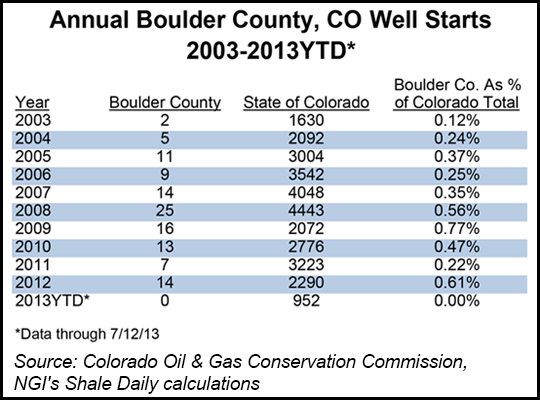Lafayette, CO, to Consider ‘Absurdly Contrary’ Anti-Drilling Initiative
A charter amendment to ban new natural gas and oil activities in Lafayette, CO, to be on the city’s ballot this fall, “could have incredibly damaging, unintended consequences,” said a spokesman for the Colorado Oil & Gas Association (COGA).

The Lafayette Community Rights Act that is to go before voters in November would halt all new gas and oil activity in the city, both conventional and unconventional. The ballot initiative follows the city council’s enactment this summer of a three-year moratorium on licensing new oil and gas operations.
Lafayette City Clerk Susan Koster last Friday dismissed the challenge to the proposed charter amendment by resident Jon Hydeman, who said the petition didn’t contain a summary of the issue for voters to read and thus had violated state law. Hydeman is to begin working for Halliburton Co. in September, but he said he has not received money from COGA, nor did he land the Halliburton employment as a result.
Initiatives to impose drilling moratoriums also are on city ballots in Broomfield, Boulder, and Loveland. COGA’s Doug Flanders told NGI’s Shale Daily that Koster’s ruling was a disappointment for the state’s energy industry.
“We are disappointed in the ruling because any local ballot measure must be clear enough for the citizens to understand,” said Doug Flanders, who directs policy and external affairs. “A ballot summary is important because the Lafayette ballot language is very confusing and could have incredibly damaging unintended consequences.”
COGA has done a preliminary review of the Lafayette charter amendment, said Flanders, “and the language is so absurdly contrary as to conflict with numerous laws and regulations. The ballot measure includes outlandish ideas such as energy companies that do not operate in Lafayette can be held responsible for any ‘harms’ occurring inside the city; energy companies are not ‘permitted’ to challenge the city charter; and that the U.S. Constitution’s commerce clause does not apply to the oil and gas industry in the city of Lafayette.”
The East Boulder County United (EBCU), which is leading the charge for the drilling ban, helped to collect more than 2,000 Lafayette residents’ signatures and argued that the city charter doesn’t require petitions to provide a summary because they are protected by the Colorado Home Rule Act, enacted in 1971.
Koster supported EBCU’s argument in making her decision. “As a home rule city, Lafayette operates under a citizen adopted charter. In the case of this protest, the petition submitted to amend the city’s charter complied with the Colorado Home Rule Act.”
Fortunately for the state, Flanders said, “Coloradoans realize complex matters take more than a sound bite to solve, and that a ban is not a plan. Banning how we produce a product we all use every minute of our lives is damaging to the Colorado brand of compromise and reasonableness.” Twenty-six Front Range municipalities have considered limiting drilling activities, but nearly all have attempted to resolve issues “with dialogue, moderation and compromise.”
EBCU spokesman Cliff Willmeng said Koster’s ruling “is beneficial to the Lafayette community action to ban hydraulic fracturing, and it further emphasizes why communities need self-determination in governing what they will look like into the future in relation to oil and gas extraction.”
Gov. John Hickenlooper, a Democrat and supporter of oil and gas development, joined the energy industry earlier this year to block almost all of the legislature’s proposed bills to revise state energy regulations (see Shale Daily,May 8). The former geologist has said he thinks drilling and conservation can coexist successfully (see Shale Daily, Aug. 17, 2012). For instance, he supports air emissions rules proposed by state regulators that would impose more stringent requirements on drilling operations (see Shale Daily, Aug. 19; July 10).
Hickenlooper’s administration has not shied away from noting its displeasure in the drilling bans enacted or being considered by the cities. Last year the administration took the city of Longmont to court for enacting a two-year drilling ban (see Shale Daily, July 17; Oct. 1, 2012). Longmont voters in November passed a ballot measure to ban unconventional drilling, which triggered another lawsuit by state officials (see Shale Daily, Nov. 8, 2012).
Many of the state’s municipalities that historically have not benefited from oil and gas drilling are in the process of enacting or are considering bans.
Fort Collins and Broomfield voters are considering five-year moratoriums in their ballot initiatives (see Shale Daily, Aug. 16; July 22). Boulder County’s commissioners in June extended a 16-month drilling moratorium by another 18 months, following the lead of the Boulder city council, which imposed a one-year drilling permit ban this summer (see Shale Daily, June 21).
Boulder County has never been a major contributor to production in the state. Last year the county only accounted for 0.43% (176,050 bbl) of oil and 0.12% (2.25 Bcf) of natural gas produced in the state, according to the Colorado Oil and Gas Conservation Commission. There were no well starts in the county this year through July 12, and there were only 14 last year, just 0.61% of the state total.
Other cities have voiced support for the energy industry, and pro-drilling advocates are attempting to derail the ballot initiatives, including in Longmont. The Colorado Springs city council last year also approved rules to allow the use of fracking, mirroring state rules (see Shale Daily, Nov. 29, 2012).
© 2024 Natural Gas Intelligence. All rights reserved.
ISSN © 2577-9877 | ISSN © 2158-8023 |

